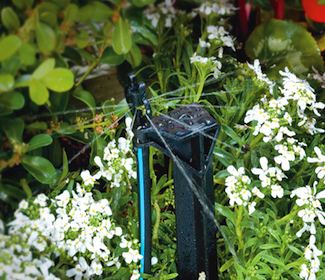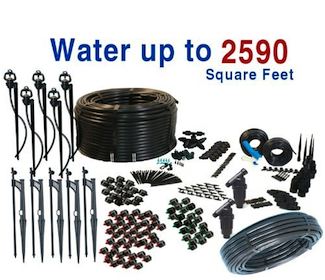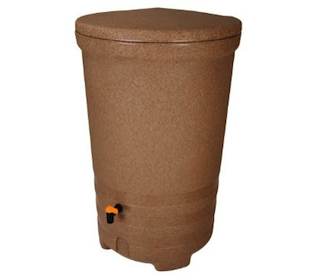Water Conservation Facts For Your Landscape

Water Saving Tips - Rainbird Irrigation
Water Conservation Facts: Irrigation Tips
So, your lawn's to the point where it's drying out and turning brown. Grass lawns will go dormant during times of drought, and recover after sufficient rainfall. But if you want your lawn to stay green during dry periods, you're going to have to water.
Following these simple tips will help you see the best results with the least amount of water:
- Water Early: Very early morning is the best time to water your lawn. The heat and direct sun of the daytime hours speed up evaporation of water. Watering early lets more of the water actually soak into the ground where it's needed. Watering later in the evening or at night can lead to lawn diseases and fungus.
- Don't Water on Windy Days: Wind also speeds up evaporation, and also winds up blowing a large amount of your water into areas that don't need it; the street, the woods, your neighbor's lawn, etc.
- Don't Water the Cement: Misplaced sprinklers or misaligned sprinkler heads can direct a lot of water onto sidewalks, driveways, or streets. These areas don't need the water; irrigating them is a pure waste of water.
- Water Deeply, but Don't Over-water: Watering grass less frequently but for longer periods will allow the water to penetrate deep into the soil to the roots. Don't go overboard, though; over-watering is a huge waste of water. An EPA water-use study found that 62% of homes exceeded their irrigation requirements by as much as 187% !
Water Conservation Facts: Irrigation Systems
If your budget allows, consider installing an irrigation system. By monitoring soil and air conditions, these systems will help you manage your water usage and not run the water when it isn't needed. Here are some ways an irrigation system can save you lots of water:
- Multiple Zones: Irrigation systems should have separate zones to properly water different areas. Drip irrigation can be used in landscaping and plant beds to deliver water directly to the soil surrounding the plants instead of spraying the entire area. This greatly reduces evaporation and is a much more efficient way to water. In grassy areas, rotating sprinkler heads are used; they should be positioned in a way that they don't overlap coverage or water paved areas or buildings. New rotating heads are available that deliver water more slowly and uniformly to allow water to soak in rather than runoff, reducing water use by up to one-third.
- High-tech Irrigation Controls: Today's irrigation controllers can save up to 40% of your water usage by monitoring weather conditions and soil moisture levels to adjust irrigation outputs as the water changes. An irrigation system that blasts away during a downpour of rain is an incredibly frustrating waste of water. Prices for these new advanced controllers are comparable to traditional timer-based controls, and should always be your first choice.
- Small-Site Micro-Irrigation: for smaller sites, micro-irrigation is a newer option. These low-pressure systems spray, mist, and drip water close to the root zone. These systems lose very little water to runoff, wind, or evaporation, and can be used with multi-zone systems.
Water Conservation Facts: Rainwater Harvesting and Greywater
For those looking to maximize water conservation even further, rainwater harvesting and greywater are becoming more popular.
Rainwater Harvesting: Collecting rain that falls on your home can be a great source of irrigation water. This can be as easy as a small rain barrel connected to a hose or as complex as an underground cistern connected to an irrigation system. Some areas have regulations limiting or banning rainwater harvesting, so check your local area before investing any amount of money in a large system.
Greywater: Greywater is household wastewater that is reused for irrigating outdoor areas. 50% of the water used in U.S. homes goes right down the drain from sinks, showers, toilets, dishwashers, and washing machines. The water that doesn't contain human or food waste (water from showers, sinks, and washing machines) can be diverted into the yard, greatly reducing water usage.
There are levels of complexity with greywater systems, from untreated systems for deep-root watering, to filtered greywater for drip irrigation, to treated greywater that can be applied to a lawn.
Greywater systems can be costly, and requires special plumbing to separate greywater from its nasty counterpart, blackwater, which should be sent to a wastewater plant where it belongs.
Like rainwater harvesting, greywater systems are not allowed in many areas, although they are starting to be approved in more and more areas, especially in areas prone to drought.
With careful planning, and a little bit of common sense, you can have the outdoor space of your dreams to compliment your green home, without an excessive amount of water. Protecting this precious natural resource is paramount for the design of any yard. Water is a limited resource, and there are billions of people in the world today that don't get enough to live on; doing our part to conserve as much as possible is the least we can do.
For more water conservation tips in the landscape, visit our article: Water Saving Tips
comments powered by Disqus




































































